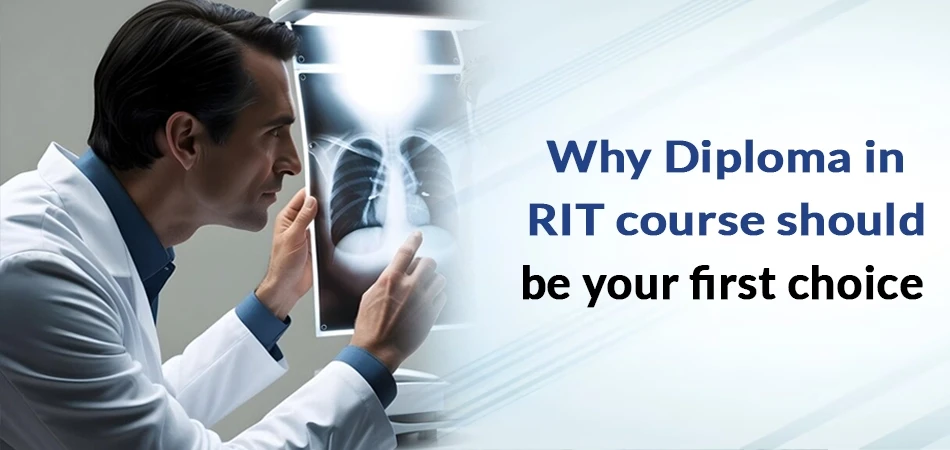Why Diploma in RIT Course Should Be Your First Choice

Throughout the two-year DRIT program, students will acquire the crucial skills and knowledge required to effectively operate various types of equipment frequently utilized in radiology and imaging facilities, including sophisticated machines. If you have a strong interest in the healthcare field and Radiology Labs. Most of the time in class is spent on teaching, helping you learn how to manage various situations and tools.
Sign up today for the top paramedical course and take advantage of the opportunity immediately.
What are the Career Opportunities after completing the DRIT course?
A Diploma in Radiologic Imaging Technology (DRIT) can lead to several promising career paths in the field of medical imaging and radiology. Here are some job options you might consider
1. Radiologic Technologist: Conduct diagnostic imaging procedures, such as X-rays, CT scans, and MRI scans, to help in diagnosing medical conditions.
2. CT/MRI Technologist: Specialize in operating computed tomography (CT) or magnetic resonance imaging (MRI) machines to obtain detailed images of the body.
3. Ultrasound Technician (Sonographer): Use ultrasound equipment to create images of internal organs and tissues, often focusing on areas such as obstetrics or cardiology.
4. Radiation Therapist: Administer radiation therapy to patients as part of cancer treatment plans, working closely with oncologists.
5. Radiology Assistant: Support radiologists by preparing patients for imaging procedures, ensuring safety protocols are followed, and assisting with image interpretation.
6. Medical Imaging Sales Specialist: Work with companies that produce or sell imaging equipment, using your technical expertise to help market and sell products.
7. Radiology Educator: Teach and train future radiologic technologists at academic institutions or in clinical settings.
8. Medical Imaging Quality Control Technician: Monitor and maintain the quality of imaging equipment, ensuring it operates accurately and safely.
9. Healthcare Administration: Work in administrative roles within imaging departments, overseeing operations, scheduling, and patient care coordination.
10. Research and Development: Contribute to advancements in imaging technology and techniques by working in research labs or with medical technology companies.
Pursuing further certifications or advanced degrees can also expand your career options and lead to more specialized roles or leadership positions in the field.
Enrol Now
Enrolling in a DRIT course in Delhi could lead to a successful career in healthcare. This is regarded as a very rewarding career choice for students aiming to enter this industry. The continuous growth of the industry is directly resulting in a rise in the demand for paramedical specialists. Join the top Paramedical College program to become an essential paramedical health professional responsible for diagnosing and caring for patients in healthcare environments. Moreover, we provide CRIT courses, BRIT courses, and MRIT courses. Make sure to register quickly at Ganesh Paramedical College.
People also ask
What is a DRIT course?
DRIT stands for Diploma in Radio Imaging Technology. This course will help you to deliver a detailed understanding of the Radiological Lab techniques and provide many job opportunities to the student.
What are the Career opportunities after completing the DRIT course?
After finishing this course you can become a Radiological Lab assistant, research analyst, Radiological Nurse, PhD in radiology Medical officer etc
What is the average salary to be expected after finishing this course?
The average salary varies from 2.5- 6 lakhs depending upon the post and rank.
How to get an inquiry for this course?
You can contact us at PH No-011-47444444 Call Centre NO-011-47333333, Mobile No-9810183948.
Do paramedical courses require NEET?
No, NEET is not required for paramedical courses. However, a few colleges might have university entrance exams for students.
Is there any entrance exam for paramedical courses?
Admission to some of the paramedical courses is based on entrance exams. This includes JIPMER, NEET-UG, MHT CET, etc.
How many years is a Paramedical course?
Certificate courses go on for a duration of 1-2 years while degree courses are for 1-4 years.
Is paramedical a good career?
There are ample job opportunities for paramedical graduates and an increasing demand for trained people in these fields.

